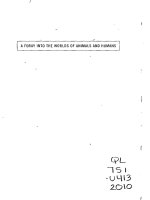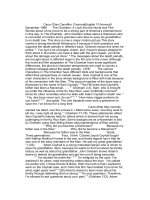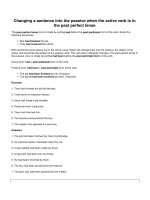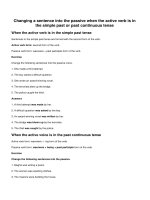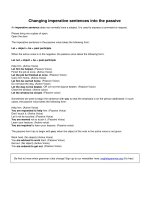Changing a sentence into the passive voice when the active verb is in the simple future tense
Bạn đang xem bản rút gọn của tài liệu. Xem và tải ngay bản đầy đủ của tài liệu tại đây (9.54 KB, 1 trang )
Changing a sentence into the passive voice when the active verb
is in the simple future tense
We make simple future tense forms by putting
will / shall
before the base form (infinitive) of the verb.
I will finish the job tomorrow.
She will come tomorrow.
If the sentence in the active voice consists of an object, we can change it into the passive. In the example
sentences given above, the first one has an object (the job). We can convert it into the passive voice.
The job
will be finished
(by me) tomorrow.
The second sentence (She will come tomorrow) doesn’t have an object. Therefore we cannot convert it into the
passive because there is nothing to become the subject of the passive verb.
The passive verb form in the simple future tense is made by putting
will / shall + be before the past participle
form of the verb.
Active form:
will/shall + first form of the verb
Passive form:
will/shall + be + past participle
form of the verb
Exercise
Change the following sentences into the passive.
1. They will tell you when the time comes.
2. She will accept the offer.
3. I will finish the job by Monday.
4. I will prepare the dinner before you come.
5. You will never forget this lesson.
Answers
1. You will be told (by them) when the time comes.
2. The offer will be accepted by her.
3. The job will be finished (by me) by Monday.
4. The dinner will be prepared (by me) before you come.
5. This lesson will never be forgotten by you.
Be first to know when grammar rules change! Sign up to our newsletter here: englishgrammar.org (It's free)
Powered by TCPDF (www.tcpdf.org)
